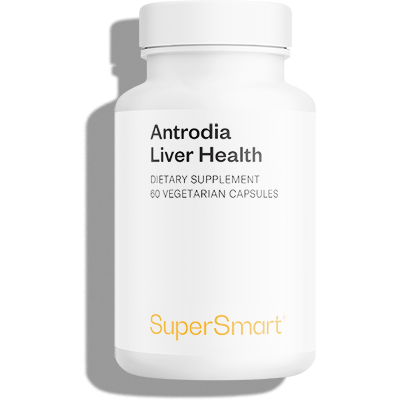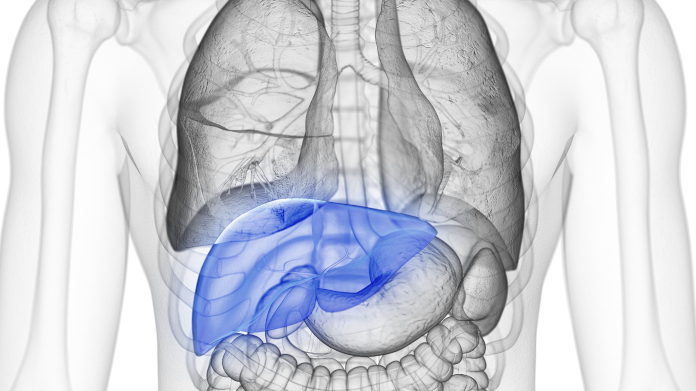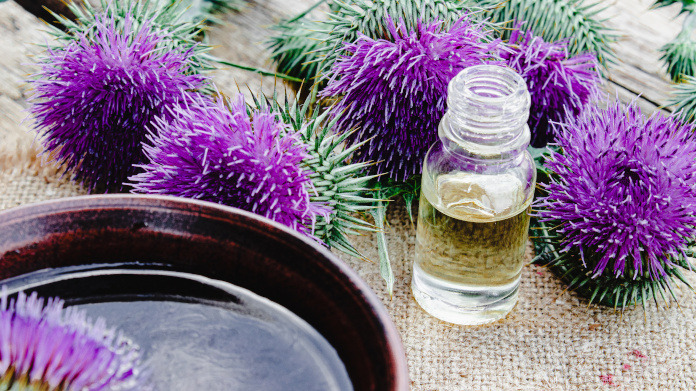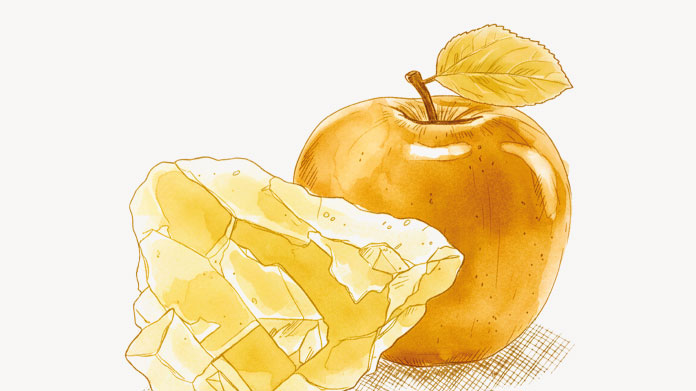Liver health: the rare Antrodia mushroom stands out from conventional approaches
A rare mushroom from Taiwan that has been successfully studied clinically, Antrodia camphorata stands out from conventional plants and antioxidants used to support the liver. Focus on an innovative ingredient.

What problems affect the liver?
Located in the upper right-hand side of the abdomen, the liver is one of the most important organs in the human body.
A true centre of metabolic regulation, it governs more than 300 vital functions.
In particular, it transforms the nutrients we ingest, neutralises toxic substances (pollutants, drugs, etc.), synthesises the body's cholesterol (needed to produce bile and sex hormones) and regulates blood sugar levels (1).
Despite its many roles, the liver remains a fragile structure.
A diet too rich in sugars, regular alcohol consumption, a sedentary lifestyle and chronic oxidative stress are all factors likely to impair its proper functioning in the long term.
There has also been a steady and worrying rise in fatty liver disease (the excessive accumulation of fat in liver cells) in industrialised countries. It is estimated that it currently affects between 20% and 30% of the world's population (2).
In response to these problems, food supplement manufacturers have long relied on antioxidants and plant extracts (milk thistle, artichoke, etc.) (3–4).
These products now dominate the market. While these natural solutions still have their place, an innovative alternative seems to be emerging. What is it called? Antrodia camphorata.
Antrodia camphorata: what are its supposed benefits for the liver?
Antrodia camphorata is a rare mushroom that grows exclusively on the trunk of the Taiwanese camphor tree (Cinnamomum kanehirae), which grows in the island's primeval forests – hence its other name, camphorated mushroom.
It is irregular in appearance, with an orange to reddish-brown hue and a woody texture.
Long used in medicine, it was taken by indigenous peoples to relieve fatigue and treat hangovers.
Traditional Chinese medicine describes it as a purifier and liver regenerator.
It is only since the 1990s that scientific publications on the subject have multiplied, particularly regarding its potential hepatoprotective effect.
Biochemically speaking, the mycelium ofAntrodia camphorata concentrates many nutrients of interest, including more than 200 types of triterpenoid, polysaccharides, nucleic acids and superoxide dismutase (SOD) (5).
However, it is its antroquinonol content, a highly bioactive metabolite unique to it, that is most likely responsible for the wide range of its pharmacological effects (6).
In vitro and in vivo studies suggest that this mushroom acts jointly on multiple levels, including reducing hepatic oxidative stress by stimulating antioxidant enzymes, inhibiting certain pro-inflammatory mediators (TNF-α, IL-6...), regulating hepatic lipid metabolism and activating hepatocyte cell repair pathways (7-8).
Clinical studies attest to the effects of ProAntro®, an Antrodia extract, on liver health
ProAntro® is a fermented extract made from the mycelium of Antrodia camphorata and standardised to contain over 0.3% antroquinonol.
It has been the subject of two rigorous clinical studies (randomised, double-blind, placebo-controlled), confirming its ability to provide effective overall support for the liver.
At the end of the first study, the 40 subjects supplemented for 12 weeks with 300 mg of ProAntro® per day showed a significant reduction in ASAT (-20.7%) and ALAT (-26.2%) levels, two characteristic markers of liver inflammation.
This suggests a probable healing of liver damage and an improvement in liver function.
Their serum triglyceride levels also fell by 16.8%, indicating better management of hepatic fatty acids (which would help prevent excessive liver congestion) (9).
The second study showed a reduction in levels of acetaldehyde (-18.64%), a toxic metabolite produced by the breakdown of ethanol, which is particularly damaging to liver tissue.
This result suggests that Antrodia Camphorata may, to some extent, reduce the toxicity of alcohol to the liver (10).
In addition to these two studies, a 90-day clinical trial on humans demonstrated that it is completely harmless and safe to use.
This is why some forward-thinking supplements have taken the plunge and included the ProAntro® compound at the heart of their formula (as in the case of Antrodia Liver Health, whose dosage of 300 mg/day is exactly in line with that used in the clinical studies).
SUPERSMART ADVICE
References
- Kalra A, Yetiskul E, Wehrle CJ, et al. Physiology, Liver. [Updated 2023 May 1]. In: StatPearls [Internet]. Treasure Island (FL): StatPearls Publishing; 2025 Jan-. Available from: https://www.ncbi.nlm.nih.gov/books/NBK535438/
- Sharma B, John S. Nonalcoholic Steatohepatitis (NASH) [Updated 2023 Apr 7]. In: StatPearls [Internet]. Treasure Island (FL): StatPearls Publishing; 2025 Jan-. Available from: https://www.ncbi.nlm.nih.gov/books/NBK470243/
- Mulrow C, Lawrence V, Jacobs B, et al. Milk Thistle: Effects on Liver Disease and Cirrhosis and Clinical Adverse Effects: Summary. 2000. In: AHRQ Evidence Report Summaries. Rockville (MD): Agency for Healthcare Research and Quality (US); 1998-2005. 21. Available from: https://www.ncbi.nlm.nih.gov/books/NBK11896/
- Panahi Y, Kianpour P, Mohtashami R, Atkin SL, Butler AE, Jafari R, Badeli R, Sahebkar A. Efficacy of artichoke leaf extract in non-alcoholic fatty liver disease: A pilot double-blind randomized controlled trial. Phytother Res. 2018 Jul;32(7):1382-1387. doi: 10.1002/ptr.6073. Epub 2018 Mar 9. PMID: 29520889.
- Geethangili M, Tzeng YM. Review of Pharmacological Effects of Antrodia camphorata and Its Bioactive Compounds. Evid Based Complement Alternat Med. 2011;2011:212641. doi: 10.1093/ecam/nep108. Epub 2011 Jan 3. PMID: 19687189; PMCID: PMC3095428.
- Kim U, Jang SI, Chen PN, Horii S, Wen WC. Hepatoprotective Effect of Antrodia camphorata Mycelium Powder on Alcohol-Induced Liver Damage. 2024 Oct 8;16(19):3406. doi: 10.3390/nu16193406. PMID: 39408373; PMCID: PMC11478381.
- Cao C, Zhong H, Chen Z, Song Z, Hu B, Wang X. Triterpene acid from Antrodia camphorata alleviates inflammation in acute liver injury. Aging (Albany NY). 2023 May 26;15(10):4524-4532. doi: 10.18632/aging.204757. Epub 2023 May 26. PMID: 37244283; PMCID: PMC10258030.
- Kuo YH, Lin CH, Shih CC. Dehydroeburicoic Acid from Antrodia camphorata Prevents the Diabetic and Dyslipidemic State via Modulation of Glucose Transporter 4, Peroxisome Proliferator-Activated Receptor α Expression and AMP-Activated Protein Kinase Phosphorylation in High-Fat-Fed Mice. Int J Mol Sci. 2016 Jun 3;17(6):872. doi: 10.3390/ijms17060872. PMID: 27271603; PMCID: PMC4926406.
- Yen YT, Park JH, Kang SH, Su T, Cheng H, Wen WC, Lin SS, Tai YL, Chen PN, Tsai SC. Clinical Benefits of Golden-Antrodia Camphorata Containing Antroquinonol in Liver Protection and Liver Fat Reduction After Alcoholic Hepatitis. Front Pharmacol. 2022 Jun 21;13:757494. doi: 10.3389/fphar.2022.757494. PMID: 35800453; PMCID: PMC9253287.
- Yen YT, Park JH, Kang SH, Su T, Cheng H, Wen WC, Lin SS, Tai YL, Chen PN, Tsai SC. Clinical Benefits of Golden-Antrodia Camphorata Containing Antroquinonol in Liver Protection and Liver Fat Reduction After Alcoholic Hepatitis. Front Pharmacol. 2022 Jun 21;13:757494. doi: 10.3389/fphar.2022.757494. PMID: 35800453; PMCID: PMC9253287.
Keywords
4 Days
The delivery was fast and the product…
The delivery was fast and the product is great
SOMMARIVA Gianni
5 Days
Great service and lots of information
Great service and lots of information
Gabi
8 Days
Service Satisfaction
I’m satisfied with the service; it fulfilled what it set out to do.
Anfhony Abreu
11 Days
Original product and fast delivery
Original product and fast delivery. I haven't started it yet, but will do soon.
Vincenza Catania
14 Days
Good quality
Good quality. Good service.
Leonel Guzman
16 Days
Top!!!!!!!!
Top!!!!!!!!
Michael
18 Days
Excellent!
Products are great and delivered fast!
PARDINI Debora
18 Days
From order to receive the product
From order to receive the product, the process is smooth & fast. It’s good to customers.
WONG Mei Ling
20 Days
Fast delivery
very quick delivery to italy. product is good.
Customer
21 Days
Prompt delivry !!👍
Prompt delivry !!👍
SWEET Christine
21 Days
Good delivery and flawless quality
AS far as delivery and the visual quality are concerned, Supersmart is excellent. I will not comment on the efficacy of the products themselves, since that is only possible over a longer period and in a large customer base compared to people who do not consume a particular product.
Roger De Backer
22 Days
Perfect services
Perfect services, perfect support, great articles about products
Michaela Alali Beitlová
23 Days
Great experience and effective supplements
I’ve purchased many types of supplements from this company over the course of years to treat a few issues, and I’m satisfied with their quality. After using them consistently for a period of time, I can say they met my expectations and I could feel real health benefits that built up over time. Deliveries are always quick. I recommend this company to anyone looking for high-quality supplements.
Giordano
23 Days
Es hat alles gestimmt
Es hat alles gestimmt. Top
marina thieme
26 Days
Great product
Great product, but still evaluating its effectiveness. Highly recommended. Super efficient delivery.
Chalise
of experience
your money back
##montant## purchase




